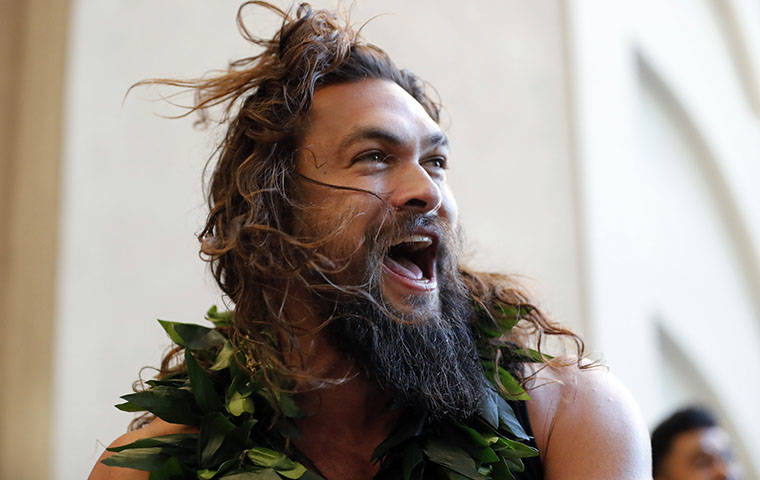Actor Jason Momoa testifies on climate change before U.N. panel


STAR-ADVERTISER
Hawaii actor Jason Momoa performed the haka, in Dec. 2018, before the premiere of Aquaman at Consolidated Theatres Ward. Momoa, known worldwide for his star role in “Aquaman,” testified today at a high-level meeting before the United Nations General Assembly addressing the priorities of small island developing states.


Actor Jason Momoa, known worldwide for his star role in “Aquaman,” testified today at a high-level meeting before the United Nations General Assembly addressing the priorities of small island states.
The U.N. General Assembly, attended by 193 member states, is holding its 74th session this month in New York. Momoa testified at a meeting held to review a global effort addressing the challenges of small island states.
Dressed in a dark suit, Momoa introduced himself as a singular representative of all island nations and a Native Hawaiian born to a mother from Iowa.
While issues facing an island can feel far removed from a place landlocked in the middle of the U.S., Momoa said that with a foothold in both worlds, he saw how a problem for one will soon become a problem for all.
“As a human family, through innovation and creativity we have elevated ourselves and perceivably stand as the most powerful beings on earth, yet our ego, our fear, our relentless drive for profits have made us the only species willing to force disharmony from the natural balance of our world,” said Momoa. “We are the living consequence of forgotten traditions. We suffer a collective amnesia of a truth that once was understood — the truth that to cause irreversible damage to the earth is to bring the same unto ourselves.”
In a somber tone, he continued: “We the island nations and all coastal communities are the frontlines in this environmental crisis. The oceans are in a state of emergency. Entire marine ecosystems are vanishing with the warming of the seas, and as the waste of the world empties into our waters, we face the devastating crisis of plastic pollution.”
Don't miss out on what's happening!
Stay in touch with breaking news, as it happens, conveniently in your email inbox. It's FREE!
Momoa referenced the Great Pacific Garbage Patch — which he said is larger than the country of France — and said that nanoplastics have been found, even in the depths of the Mariana Trench.
Entire islands are drowning into the sea due to the enormous volume of carbon emissions generated by first-world countries, he said.
“Island nations contribute the least to this disaster but are made to suffer the weight of these consequences,” he said. “Our governments and corporate entities have known for decades that immediate change is needed, yet change still has not come. And when the front line is gone, we are doomed. There is no undoing. If you continue to watch unsympathetic to the issues of island nations this realization will soon come that you stood by and witnessed the world across the critical tipping point, ushering the death of our planet.”
He went on to urge governments and corporations to choose the basic rights of children to live on Earth over short-term profits, and called for global unity.
“Change cannot come in 2050 or 2030 or even 2025,” he said. “Change must come today.”
He ended his testimony with a proverb comparing an island to a canoe, saying that “our planet is nothing more than an island floating amongst an ocean of stars.”
“We must work together as a global community to best steer our canoe in the right direction — the direction of a healthy and abundant future on Earth that we call home,” he said.
Momoa concluded the speech by forming a triangle symbol with his hands, and saying: “Ku Kia‘i Mauna!” in solidarity with those opposed to the construction of the $1.4 billion Thirty Meter Telescope on Mauna Kea.
The meeting was held to discuss progress on the SAMOA Pathway, and how greater international assistance is needed to address the needs of small island states facing a climate emergency.
SAMOA stands for Small Island Development States Accelerated Modalities of Action, and is a 10-year program promoting international assistance to address the unique set of challenges that island states face.
The U.N.’s Intergovernmental Panel on Climate Change’s latest special report Opens in a new tab, released this week, warns that without major investments in adaptation, some island nations are likely to become uninhabitable.
Momoa’s entire testimony was posted online by UN Web TV Opens in a new tab.



